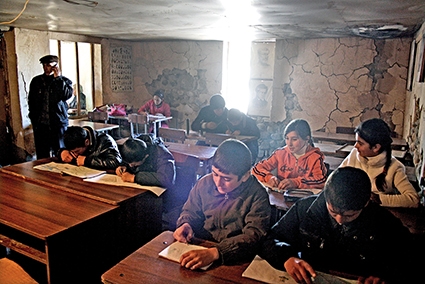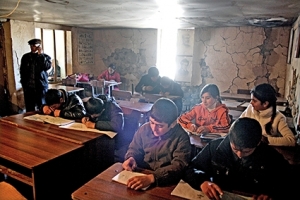Bakhtadze Promises New & Renovated Schools
Georgian Prime Minister Mamuka Bakhtadze briefed his government on Wednesday, February 13. Among other topics, he announced a new project to build 28 new schools and renovate 83 existing schools across Georgia.
The 50 million GEL ($18.98 mln) project will be headed by the Municipal Development Fund, supported in part by a grant from the Eastern Europe Energy Efficiency and Environment Partnership (E5P) and in part by a loan from the Nordic Environment Finance Corporation (NEFCO)
About the project, Bakhtadze said, “Education is my government’s key priority, which is why we have launched a substantial educational reform, with infrastructure as one of its important components. Unfortunately, we inherited a very difficult legacy in this regard. Infrastructural problems in schools have been studied thoroughly, and priorities have been defined accordingly. We are working with donor organizations and friend-countries to attract more resources to deal with these problems.”
Public schools in Georgia’s regions, especially in small villages, are often small, cold, and damp. Many villages in Georgia are not connected to the national gas infrastructure, and using wood-burning stoves in classrooms poses a safety hazard. Many students avoid going to school in the coldest months, and even then must wear their coats inside – unless their seat is right next to the stove, in which case they are unbearably warm. The infrastructure of many school buildings is in dire need of repair or replacements. There is little to no maintenance done on most rural schools, which are missing plaster and paint, have holes in the ceiling and floor from water damage or rot, and see kids careening up and down staircases with shaky, broken metal railings. The government under Bakhtadze and his Education Minister Mikheil Batiashvili has recognized these problems and moved to address them, although the scope of the challenges is overwhelming considering the government’s limited resources. International donor and lending organizations have stepped in to assist with the education reform plans.
Another major government initiative is the decentralization of power and decision-making, supported by doubling the sum of financial transfers to municipal governments, earmarked specifically for renovating and rehabilitating rural schools. “40 million GEL [$15.18 mln] worth of rehabilitation works have been carried out in stages on 57 municipal schools,” explained Bakhtadze. “Importantly, local self-governments were authorized to plan and implement these works, which reaffirms our policy in this direction. We believe that local authorities are best aware of the needs of schools on the ground, and therefore problems will be solved more efficiently. It is also symbolic that this year marks the 100th anniversary of the first local self-government elections in Georgia. We have taken numerous steps to empower local self-government, and delegating authority in this manner is a positive step which will continue in the future”.
E5P, NEFCO, and Denmark are together co-financing a project on energy efficiency in Georgia that began in the spring of 2018. NEFCO is providing a total of EUR 2.83 million in loan financing for the project, while E5P is adding EUR 1.87 million in grant funding and the Ministry of Foreign Affairs of Denmark is offering EUR 440,000 worth of in-kind project consultancy support. The project, of which the new school building initiative is part, is focused on building and renovating public buildings such as schools, kindergartens, and municipality administration offices to meet European energy efficiency standards. Energy-efficiency measures include improvements to roofs, walls and pipes, installing new ventilation systems, boilers, heat pipes, thermostatic valves and other automated control systems, LED lights and solar powered energy systems. NEFCO predicts that “The planned energy efficiency measures will generate annual cost-savings of approximately EUR 200,000 for the Government of Georgia. The expected annual CO2 reductions are approx. 1,300 tons. Furthermore, up to 10,000 people, mainly children, teachers and public employees will benefit from the upgraded buildings and better conditions.” NEFCO provides what is calls “results-based green financing” to countries in Eastern and Central Europe and signed the current framework agreement with Georgia in 2014.
Check out Friday’s issue of GT for more on the educational reforms and the national Civics Education Program.
By Samantha Guthrie
Image source: Giorgi Cheishvili, Liberali












